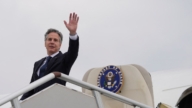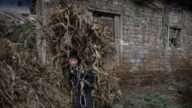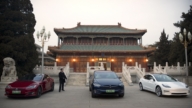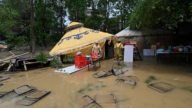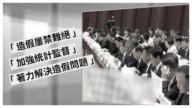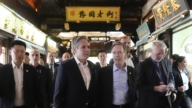【新唐人2014年09月19日訊】8月份,中國工業增長速度急劇下降,中共的經濟政策再次走到了十字路口。大規模刺激很顯然會導致通貨膨脹劇增,但不採取刺激措施的話,經濟又搖搖慾墜。專家指出,央行日前向5大銀行再次注資5000億人民幣,正是中共當局進退維谷的反映,而且仍然無法解決中國經濟面臨的困境。
日前,中國銀行業一名高管,向美國《華爾街日報》透露,中共央行近期向中國五大國有銀行,注入了5000億元流動資金,來應對國內比預期更糟糕的經濟放緩局面。
這次注資,採用向銀行提供3個月期低息貸款的形式,注資規模相當於把商業銀行存款準備金率,下調了50個基點。
這位管理人士還稱,雖然這一定向貸款,並不附加明確條件,但預計央行將引導銀行,將信貸投向當局認為對經濟很重要的領域。
美國南卡羅萊納大學艾肯商學院教授謝田:「其實反映出來他們一種非常矛盾、左右為難的這樣一種境地,顯然他們又想刺激經濟,但是又不敢刺激得過多,他們也知道通貨膨脹的危險,不敢不刺激,也不敢大刺激,實際上還是處在面臨經濟危機的最緊迫的時刻。」
此前,中共公布了一系列令人失望的經濟數據。8月份,規模以上工業增加值增長6.9%,創下自2008年12月以來的新低。此外,1-8月固定資產投資增速,比1-7月回落0.5個百分點,延續了近兩年穩步下行的趨勢。
而8月份的社會融資規模,比去年同期減少了6267億元﹔代表居民消費價格指數的CPI漲幅,也創下近4個月以來的新低﹔與此同時,代表全面經濟指標的PMI環比下降了0.6個百分點,而非製造業新訂單指數也下跌到50,創下2009年5月以來新低,進口同比下降了2.4%。
9月18號,中共統計局發佈了8月份城市住宅銷售價格統計數據,以及新建商品住宅價格變動情況,70個大中城市中,價格下降的城市達到68個。
儘管開發商大幅降價、地方政府放鬆限購政策,但沒有銷售出去的住宅地產供應量,還在繼續增加,觸及記錄最高水平。
面對目前疲弱的經濟形勢,降低利息和降低基準利率的呼聲,再一次響起。但中共央行的官員們卻一直表示,如果實施降息等力度更大的寬鬆政策,可能會導致信貸氾濫,惡化中國的債務問題,使經濟面臨更大風險。
而美國摩根士丹利(Morgan Stanley)的經濟學家認為,目前這種通過央行印製鈔票注資的刺激,控制權掌握在央行手裡,是在選擇有條件的放鬆舉措,來抵制要求下調利率,或者全面下調銀行存款準備金率的壓力。
渣打銀行(Standard Chartered)經濟學家李煒指出,如果決策者將高債務水平的問題,簡單歸咎於之前下調存款準備金率和利率的行動,是不公平的。因為這當中存在國家對銀行業的壟斷、缺乏利率市場化等諸多問題。 這次央行注資5000億,不太可能提振市場人氣。
花旗集團(Citigroup)經濟學家瀋明高、丁爽則認為,在降低融資成本方面,大範圍下調政策利率,比含蓄地下調存款準備金率,更加透明和有效。
中國金融智庫研究員鞏勝利:「它這個是臨時手段,不是解決問題的辦法。簡單的說,就是中國經濟的運行成本,依然是居高不下,美元、歐元、日元幾乎都是零利率的水平,而中國的利率是全球,特別是20個大國來講,可能是最高的,它的基準利率是6.2%。」
中國金融智庫研究員鞏勝利說,中國的利率也不像其他國家一樣穩定。據他統計,金融海嘯以來,中國的利率調整過40多次。
鞏勝利還指出,中國經濟運行成本高,還體現在政府構架方面,其他國家不會超過4級構架,而中國有7級政府構架,尤其黨政同時運行的體制,給中國經濟帶來了巨大負擔。
採訪編輯/劉惠 後製/舒燦
CCP Central Bank Pumps Money,
The Authorities in Dilemma
The month of August saw a sharp decline
in China’s industrial growth rate.
Now China’s economy is again at a crossroads.
Massive stimulus will likely lead to a surge in inflation,
but without it the economy will crumble.
Experts say that mainland China’s Central Bank’s recent
pumping of 500 billion yuan ($81 billion) into China’s five
major banks reflects the dilemma Chinese authorities face.
However, it cannot solve the issues the economy is facing.
A Chinese banking executive has told the Wall Street Journal
that the Chinese Communist Party (CCP)’s central bank recent
500 billion yuan injection of liquidity to five state-owned banks,
to deal with worse-than-expected domestic economic slowdown.
The capital injection was provided in the form of
three monthly low-interest loans,
with a scale equivalent to 50 basis points down
for deposit reserve ratio of commercial banks.
The executive also said although the fixed loans
don’t have specific conditions, the central bank will
guide the banks to loan the money to areas
considered by the authorities as very important to the economy.
Frank Xie, business professor at University of South Carolina
Aiken: “It reflects their dilemma.
Obviously they want to stimulate the economy,
but they dare not do too much.
They also know the danger of inflation.
They dare not just do nothing,
but also dare not to do too much.
They are in fact still at the most urgent moment
facing the economic crisis."
Earlier this year, the CCP released economic data
showing a series of disappointing results.
In August, above-scale industrial added value
increased 6.9 percent, the lowest since December 2008.
In addition, the fixed asset investment growth rate
from January to August was down 0.5 percent
compared to the growth rate from January to July,
continuing the steady downward trend on the past two years.
The scale of social financing in August was 626.7 billion yuan
($102 billion) lower than the same period last year;
increase of consumer price index also hit the newest low
in four months; meanwhile, PMI comprehensive economic
indicators fell 0.6 percent, non-manufacturing
new orders index fell to 50, a record low since May 2009
and imports fell by 2.4 percent year over year.
On Sept. 18, the CCP’s Bureau of Statistics released the urban
residential sales price statistics and new residential housing
price changes for August.
It shows that prices declined in 68 of 70 cities.
Although developers are slashing prices and
local governments are relaxing purchase restriction policy,
the supply of houses and residential real estate
continue to increase, reaching a record high.
Faced with the current weak economy, there have again been
calls for lower interest rates and a benchmark interest rate.
The CCP’s central bank leadership has been saying that
greater efforts to cut interest rates may result in
proliferation of credit, deterioration of China’s debt problem
and greater risks to the economy.
U.S.-based financial services corporation Morgan Stanley
economists say that the central bank’s capital injection stimulus
is a conditional measure controlled by the bank.
It’s done to resist the pressure of cutting interest rates or
overall decreasing bank deposit reserve ratio.
Standard Chartered Bank economist Li Wei says it’s unfair
if policy makers simply blame the issue of
high debt on bank deposit reserve ratios and interest rates.
There are many problems such as monopoly of the banking
sector, lack of market interest rates and many other problems.
The 500 billion yuan from the central bank
is unlikely to boost the market.
Citigroup economists Shen Minggao and Ding Shuang say
a wide range of rate cuts is more transparent and effective
than lowering the deposit reserve ratio
in terms of the lower financing costs.
Gong Shengli, Chinese financial think-tank researcher:
“This is a temporary fix, not a solution to the problem.
To put it simply, the operating costs of China’s economy
is still high.
With the interest of dollar, euro and yen almost at zero,
China’s benchmark interest rate is 6.2%,
possibly the highest in the world,
especially among the 20 big countries."
Gong says that China’s interest rates
are not as stable as other countries.
Based on his calculations, China’s interest rate
has been adjusted over 40 times since the financial crisis.
Gong also says that the high operating costs of China’s
economy are also reflected in the government structure.
The governmental structure of most other countries include
no more than four layers, but China’s has seven layers.
The simultaneous operation of both the political system
and the Party system has brought
huge burdens to China’s economy.
Interview & Edit/LiuHui Post-Production/ShuCan



